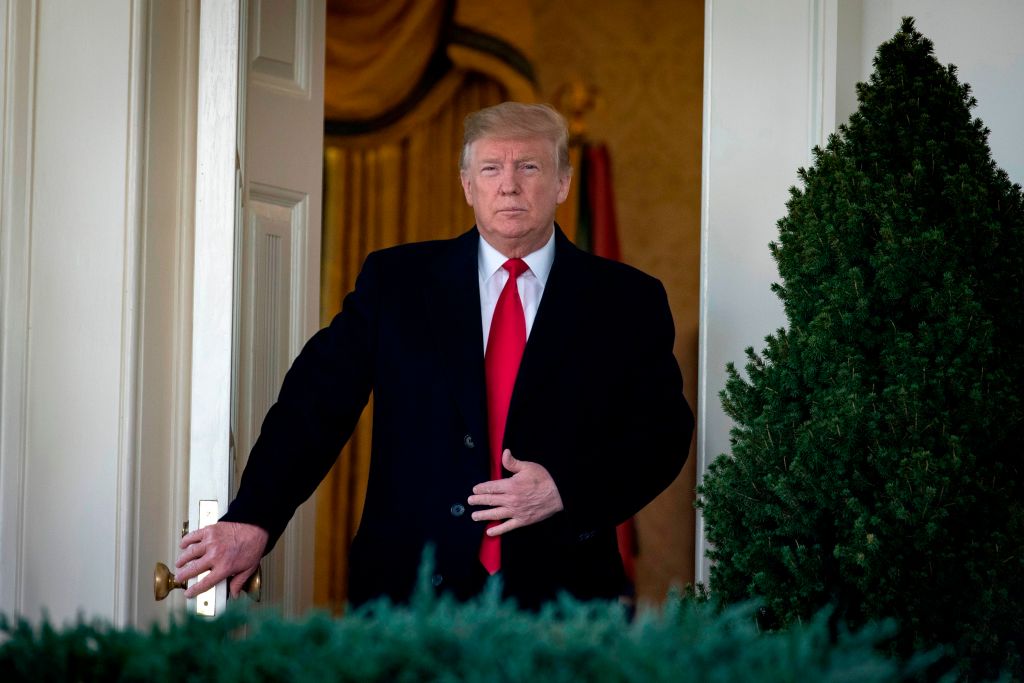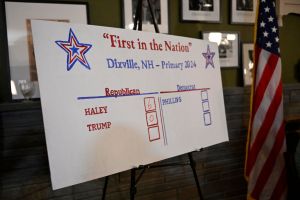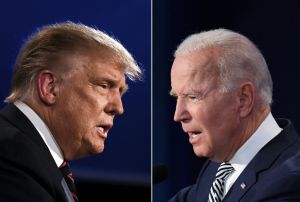One of the lessons of the Trump era has been that Trump’s establishment critics are incapable of learning anything or reforming their ways. The same political and policy analyses they unsuccessfully applied in 2016 — which told them there was no chance Trump would get the GOP nomination, let alone become president — now lead them them to think Trump will get ‘primaried‘ in 2020. Could they be right for once?
Not really, but it’s worth remembering that four of the last five Republican presidents have faced primary challenges during the re-election campaigns. Getting primaried is in fact the norm for Republican presidents over the last half-century, with only George W. Bush, flush from the initial phases of the Iraq War, not having any experienced challenger in 2004. Reagan’s challenger 20 years before that was certainly experienced — a former governor of Minnesota — but by 1984 was a truly trivial figure: Harold Stassen is the man whose face appears in the political dictionary beside the term ‘perennial candidate.’
The two primary challenges everyone remembers, if they remember any at all, are those of Reagan in 1976, against incumbent Gerald Ford, and Pat Buchanan in 1992, against George H.W. Bush. Easily overlooked are the challenges that Richard Nixon drew in 1972. Nixon’s challengers were two congressmen, the movement conservative stalwart John Ashbrook from Ohio and an antiwar liberal from California, Pete McCloskey. Ashbrook received nearly 10 percent of the vote in the New Hampshire primary, and McCloskey took nearly 20 percent. Nixon won with 67 percent of the vote.
Ashbrook had been encouraged to run by conservatives who thought Nixon was too much of a big-government president and too soft on the Cold War. The idea was to use Ashbrook to show how powerful true conservatives were within the GOP. But his challenge had the opposite effect — it confirmed that the dozen or so movement conservative leaders who repudiated Nixon commanded very little support in real-life politics. Conservatives were mostly loyal to Nixon, and to the extent there was any market for an alternative to Nixon, it was actually on the left side of the party. Nixon, of course, far from being bloodied by being primaried by two sitting congressmen from his own party, went on to win a 49-state landslide victory against his Democratic opponent, George McGovern, in November. History may well repeat itself if Democrats next year choose a nominee too far to the cultural left of Middle America — though Republicans should be mindful of the threat from the economic left. Republican donors for the most part are mindful of that, which is why they are for Trump, as they were once for Nixon.
In 2016, NeverTrumpers clung to the hope of sabotaging Trump from the center-right until the bitter end — when efforts to beat Trump in the Republican primaries failed and attempts to stir up a convention revolt came to nothing (beyond Ted Cruz telling delegates, ‘vote your conscience,’ which they promptly did by nominating Trump), the desperate neocon splinter of the GOP cast about for a third-party candidate to siphon votes from Trump in November. Tellingly, they never considered throwing their support behind the Libertarian party’s ticket, which consisted of former Republican governors Gary Johnson and William Weld. When the NeverTrumpers couldn’t find anyone of even a Harold Stassen level of credibility to run against Trump in November, they settled on a former CIA operative named Evan McMullin. Needless to say, he didn’t make a dent in Trump’s victory that November. Neither, it must be said, did Johnson-Weld.
Looking ahead to 2020, the more important question to ask about a Republican primary challenge to Trump is not whether there could be one at all, but if there were one, would it be a Stassen challenge, or an Ashbrook-McCloskey, or a Buchanan ’92 or Reagan ’76? Based on McMullin’s performance last time around, what can anyone realistically imagine? Any pundit who tells you even an Ashbrook-level challenge is likely getting ahead of the evidence.
Suppose, for example, Maryland governor Larry Hogan were to primary Trump. What would he run on? Open the borders? Invade Syria? A fresh Cold War with Russia? Where is the appetite for anything distinctively anti-Trump in policy terms among Republican voters? The insurmountable problem faced by NeverTrump isn’t Trump, it’s the Republican party. Is Hogan going to get to Trump’s right on judges or tax cuts? What exactly would a Hogan candidacy sell that Republican voters would care to buy? The insider answer might be electability — Trump’s poll numbers are so bad you have to take someone else — but anyone who isn’t an amnesiac will recall that ‘electability’ and bad numbers were the backbone of the NeverTrump case in 2016, too. Not only did Republican voters not care, they proved to be a hell of a lot smarter than the NeverTrump pundits. They backed a winner.
The pundits proved so wrong in 2016 have retroactively manufactured a number of excuses to prove they were not really wrong — crowded GOP primary field, Hillary a weak candidate, Russian interference — all of which are designed to avoid facing not only their own lack of political intelligence but also the reality of today’s GOP. This is not the party of the Reagan era or even of the George W. Bush years — which were unrepresentative in any event, given the distorting effects of 9/11 and the wars that followed. The GOP of today was born in 2008-9. The Tea Party, Sarah Palin, and the backlash against Obama’s election established the populist orientation of the GOP a decade ago, while the success of Ron Paul and Mike Huckabee in deviating from Bush Republican orthodoxy on foreign policy and economics outlined the policy mutation taking place. There was even a champion of restricting immigration in the ’08 Republican presidential contest, then-Colorado congressman Tom Tancredo.
This new GOP, the prototype of Trump’s party, lost out to what would soon be labeled NeverTrump candidates in 2008 and 2012 — John McCain and Mitt Romney. But that was more a sign of the divisions within the new GOP than it was of the strength of the Bush/neoconservative/NeverTrump establishment. Bill Kristol himself knew that McCain has no hope of mobilizing the right in November 2008 without someone like Sarah Palin as his running mate. And Romney, a lifelong political chameleon, in 2012 had to disguise himself as an immigration restrictionist — remember ‘self-deportation’? — in order to fire up his base for November. Yet in both cases, proto-NeverTrump Republicans at the head of a proto-Trump party failed. Only when the Trump party had an actual Donald Trump as leader did it succeed, and against a woman who was just months earlier considered the most popular politician in America.
Trump is not assured either victory or defeat in November 2020. His odds, however, in spite of the debacle the government shutdown proved to be, are if anything better than they were at this point in 2015, when no one (myself included) thought he could become president. But if a Democrat should beat him next year, the result won’t be to reset the Republican party to what it was in the NeverTrump golden age, the Bush era. Rather, the GOP will become even more insurgent and populist in opposing the next Democratic president, just as it shifted right in the Obama years. It will be a joyous time for the next wave of right-wing troublemakers, just as the Trump era is a boom time for the radical left. What those who pine for a return to the managed, middle-for-the-road politics of the Bush years do not understand is that the wars, the Great Recession, and the country’s ongoing cultural revolution have made anything other than populism impossible.


















